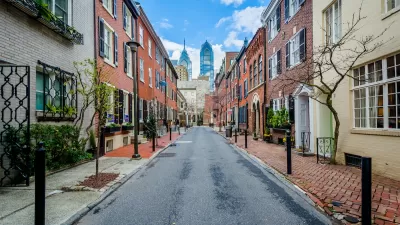Philadelphia's city council passed the city's first-ever residential development impact tax, a plan that could boost the city budget by $9 million a year.

With a new 1% tax on residential development in Philadelphia, city leaders are moving to fund a $400 million bond package that supports building more affordable housing. The tax will be levied on new construction and is accompanied by a 10% reduction in commercial abatement. The reforms, part of a package known as the Neighborhood Preservation Initiative, will fund a variety of community development and affordable housing programs. In a move seen by many as appeasing developers, the city council also voted to push back the commercial abatement reduction by a year.
Building industry groups are split on the new tax. While some admit that the city needs revenue for affordable housing, others maintain that any new taxes threaten the economic development and jobs created by construction. Philadelphia's director of finance, Rob Dubow, argues that the tax could raise $15 million in its first two years, a much-needed injection of cash into the city's coffers. The commercial abatement reduction is projected to eventually raise $5-7 million per year.
With a poverty rate of 25%, the highest of any large U.S. city, Philadelphia desperately needs affordable housing and community development programs that address inequities and support low-income residents.
FULL STORY: Philly passes first-ever development impact tax, delays abatement reductions for another year

Alabama: Trump Terminates Settlements for Black Communities Harmed By Raw Sewage
Trump deemed the landmark civil rights agreement “illegal DEI and environmental justice policy.”

Planetizen Federal Action Tracker
A weekly monitor of how Trump’s orders and actions are impacting planners and planning in America.

The 120 Year Old Tiny Home Villages That Sheltered San Francisco’s Earthquake Refugees
More than a century ago, San Francisco mobilized to house thousands of residents displaced by the 1906 earthquake. Could their strategy offer a model for the present?

In Both Crashes and Crime, Public Transportation is Far Safer than Driving
Contrary to popular assumptions, public transportation has far lower crash and crime rates than automobile travel. For safer communities, improve and encourage transit travel.

Report: Zoning Reforms Should Complement Nashville’s Ambitious Transit Plan
Without reform, restrictive zoning codes will limit the impact of the city’s planned transit expansion and could exclude some of the residents who depend on transit the most.

Judge Orders Release of Frozen IRA, IIJA Funding
The decision is a victory for environmental groups who charged that freezing funds for critical infrastructure and disaster response programs caused “real and irreparable harm” to communities.
Urban Design for Planners 1: Software Tools
This six-course series explores essential urban design concepts using open source software and equips planners with the tools they need to participate fully in the urban design process.
Planning for Universal Design
Learn the tools for implementing Universal Design in planning regulations.
Clanton & Associates, Inc.
Jessamine County Fiscal Court
Institute for Housing and Urban Development Studies (IHS)
City of Grandview
Harvard GSD Executive Education
Toledo-Lucas County Plan Commissions
Salt Lake City
NYU Wagner Graduate School of Public Service





























